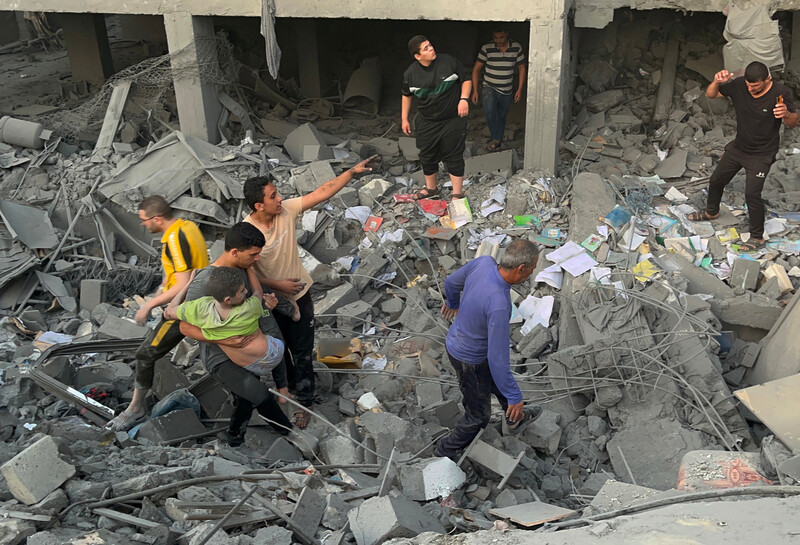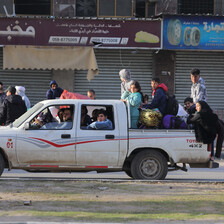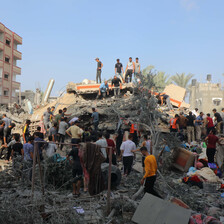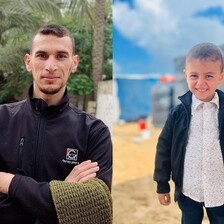The Electronic Intifada 16 November 2023

The city of Deir al-Balah has been bombed repeatedly since Israel began its genocidal war on Gaza.
APA imagesDestruction and despair have become all too familiar.
One morning, we woke up to the news that the al-Zahra neighborhood had been attacked.
My brother Muhammad goes for kidney dialysis in a hospital three times a week. He wasn’t sure that morning if he should keep his appointment.
After much contemplation, Muhammad decided that he would. I accompanied him on the dangerous journey from our home in Deir al-Balah, central Gaza.
As we made our way to the hospital – our hearts heavy with worry – we prayed fervently for our safety.
Amid the tense atmosphere, we asked, “When will the war end?”
“I hope it will be over soon,” I said.
“I hope so, too,” Muhammad replied.
As we entered the hospital, I saw lifeless bodies.
I saw people sleeping on the floor.
I saw a man with a dead child. The grief in his face was all too evident.
Muhammad spoke to other patients.
Despite all the suffering, we managed to laugh. A man in his 50s waxed philosophical about Muhammad’s kidneys.
A kidney complaint, he said, was not an illness to be conquered but a challenge to be faced with determination and strength.
Little did the man know that our family’s fortitude was about to face a huge test.
Devastating news
At 11 AM, my sister-in-law called with some devastating news. Our home had been bombed.
A wave of anguish washed over with me as I tried to take what I had just been told. I was afraid that someone had been hurt – or worse.
I called my parents. No reply.
I called them again. Still no reply.
Finally, I was able to reach my father. He immediately said, “All the children are OK.”
Two years ago, one of my brothers brought his Filipino wife and their seven children to Gaza. They had been in the United Arab Emirates but found the cost of living there unaffordable.
My father, 74, considers himself the main person taking care of the children. He often says, “Your brother entrusted them to me.”
Every day since Israel’s latest war on Gaza began, my dad has woken up and immediately concentrated on the task of finding bread for them. He is determined to ensure that the children never feel unsupported.
Muhammad had begun his dialysis session before he heard about the attack on our house.
He could see me while he was having the treatment and could sense there was something wrong. Unable to bear the weight of keeping the news secret, I told him what had happened to our home.
Muhammad begged the closest nurse to end the dialysis session.
Amid the chaos, we set off back to what remained of our home. We struggled to find a car that would drive us there.
The once bustling streets had been devastated by war.
Finally, we reached the street leading to our home. It felt eerie – people were pointing to the ruins of our home.
Fear gripped our hearts as we approached the house.
One side still stood defiantly. The other bore the scars of a direct hit.
My family had taken shelter in a neighbor’s house.
Sorrow and relief
I shed tears of sorrow – mingled with a sense of relief – as I embraced my parents and my seven nieces and nephews who had survived the onslaught.
Everyone’s voices trembled with emotion as they recounted the sheer terror they had endured.
My 7-year-old nephew was particularly traumatized.
He shook nonstop. For a while, his eyes would not move.
In the aftermath of this devastating attack, my family decided to leave for Rafah, Gaza’s southernmost city.
With transportation options limited, more than 10 of us squeezed into a taxi that is only supposed to take four passengers.
If it wasn’t for the war, we would have been harvesting olives over the past few weeks. Everyone eagerly awaits the olive season.
We would also be relishing dates and palms that had been freshly gathered.
Some people ridicule the residents of Deir al-Balah. We are often compared to chickens because we go to bed early.
“Do you really go to bed at six, Ghada?” people ask me.
My response is a resounding “Yes.”
The reason why we have adopted the habit of retiring at six in the evening is because our lives revolve around agricultural pursuits which require an early start.
Now, everything has changed.
People go to bed at six with a fervent wish to wake up the next morning alive. They pray that no airstrikes will harm them or their loved ones during the hours of darkness.
People sleep in the same rooms, seeking safety in numbers, knowing that if an airstrike occurs, they will all be affected. No one will have to mourn the loss of someone they love.
Sleeping early has become a way to escape a nightmarish reality. We hope to find a little solace in our dreams.
Ghada Abed is a journalist based in Gaza.





